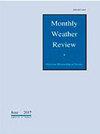Investigating the relationship between polarimetric radar signatures of hydrometeor size sorting and tornadic potential in simulated supercells
IF 3
3区 地球科学
Q3 METEOROLOGY & ATMOSPHERIC SCIENCES
引用次数: 0
Abstract
The national upgrade of the operational weather radar network to include polarimetric capabilities has lead to numerous studies focusing on polarimetric radar signatures commonly observed in supercells. One such signature is the horizontal separation of regions of enhanced differential reflectivity (ZDR) and specific differential phase (KDP) values due to hydrometeor size sorting. Recent observational studies have shown that the orientation of this separation tends to be more perpendicular to storm motion in supercells that produce tornadoes. Although this finding has potential operational utility, the physical relationship between this observed radar signature and tornadic potential is not known. This study uses an ensemble of supercell simulations initialized with tornadic and nontornadic environments to investigate this connection. The tendency for tornadic supercells to have a more perpendicular separation orientation was reproduced, although to a lesser degree. This difference in orientation angles was caused by stronger rearward storm-relative flow in the nontornadic supercells, leading to a rearward shift of precipitation and, therefore, the enhanced KDP region within the supercell. Further, this resulted in an unfavorable rearward shift of the negative buoyancy region, which led to an order of magnitude less baroclinic generation of circulation in the nontornadic simulations compared to tornadic simulations.研究模拟超级单体中水文气象卫星尺寸排序的极化雷达特征与龙卷风势之间的关系
国家对运行中的天气雷达网络进行了升级,将极化能力纳入其中,这导致了许多研究,重点关注在超级单元中常见的极化雷达特征。一个这样的特征是由于水文气象的大小排序,具有增强的微分反射率(ZDR)和比微分相位(KDP)值的区域的水平分离。最近的观测研究表明,在产生龙卷风的超级单体中,这种分离的方向往往更垂直于风暴运动。尽管这一发现具有潜在的操作效用,但观测到的雷达特征与龙卷风势之间的物理关系尚不清楚。这项研究使用了一组用龙卷风和非龙卷风环境初始化的超级单体模拟来研究这种联系。龙卷风超级单体具有更垂直的分离方向的趋势被再现,尽管程度较低。这种方位角的差异是由非风暴超级单体中更强的向后风暴相对流引起的,导致降水量向后移动,从而导致超级单体内KDP区域增强。此外,这导致了负浮力区域的不利后移,这导致与龙卷风模拟相比,非龙卷风模拟中的斜压环流生成减少了一个数量级。
本文章由计算机程序翻译,如有差异,请以英文原文为准。
求助全文
约1分钟内获得全文
求助全文
来源期刊

Monthly Weather Review
地学-气象与大气科学
CiteScore
6.40
自引率
12.50%
发文量
186
审稿时长
3-6 weeks
期刊介绍:
Monthly Weather Review (MWR) (ISSN: 0027-0644; eISSN: 1520-0493) publishes research relevant to the analysis and prediction of observed atmospheric circulations and physics, including technique development, data assimilation, model validation, and relevant case studies. This research includes numerical and data assimilation techniques that apply to the atmosphere and/or ocean environments. MWR also addresses phenomena having seasonal and subseasonal time scales.
 求助内容:
求助内容: 应助结果提醒方式:
应助结果提醒方式:


